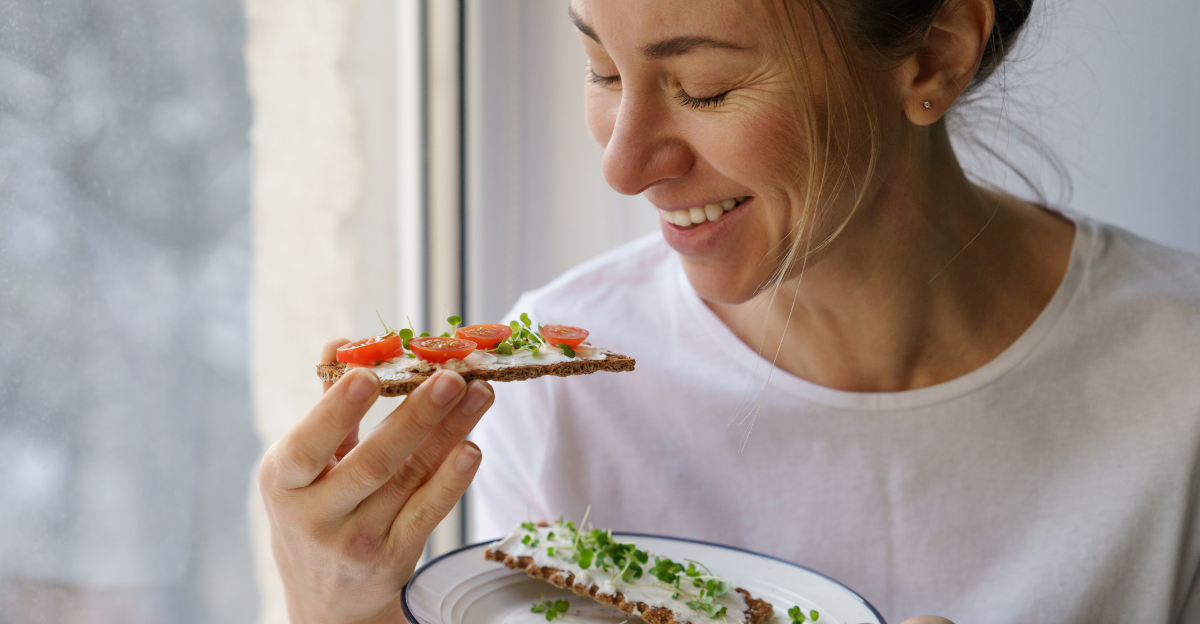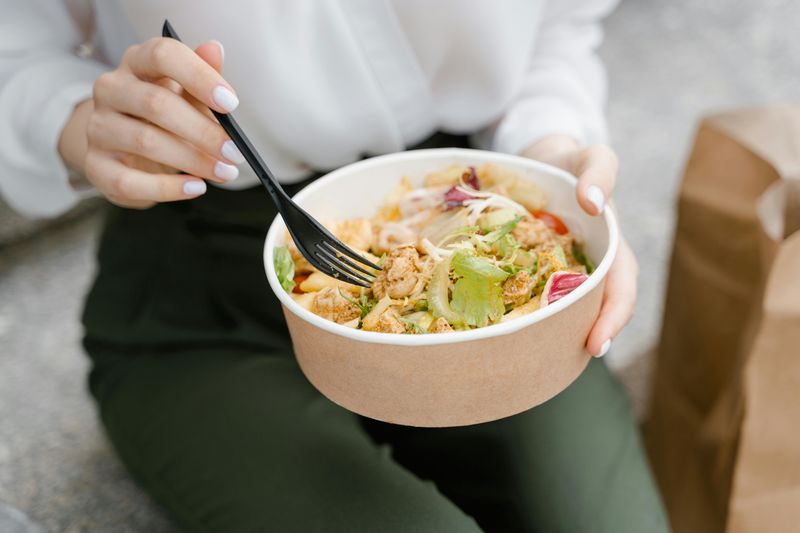Midlife brings changes that can make you feel tired and frustrated with your body. But what if eating could actually give you more energy instead of making you feel guilty? Mindful eating is about paying attention to your food and how it makes you feel, without strict diets or boring rules. These simple habits will help you enjoy meals more and feel amazing in your own skin.
1. Pause Before You Eat
Taking just a moment before diving into your meal can completely transform your eating experience. Your body needs time to switch from busy mode to digestion mode, and a simple pause helps make that happen.
Try taking three deep breaths before your first bite. This signals your brain that food is coming and helps you notice whether you’re actually hungry or just eating out of habit.
When you pause, you also get a chance to check in with yourself. Are you stressed, tired, or truly ready to enjoy this meal? That tiny moment of awareness sets the tone for everything that follows.
2. Eat Without Distractions
Ever finish a meal and barely remember tasting it? That happens when your mind is somewhere else entirely. Scrolling through your phone or watching TV while eating disconnects you from the actual experience of nourishing your body.
When you eat without distractions, you can actually taste the flavors and textures of your food. You notice when you’re getting full, which helps prevent overeating.
Start small by putting your phone in another room during one meal a day. You might be surprised at how much more satisfying food becomes when you’re fully present for it.
3. Engage All Your Senses
Food isn’t just about taste—it’s a full sensory celebration. Notice the bright colors on your plate, the steam rising from hot soup, or the crunch of fresh vegetables. These details make eating so much more enjoyable.
Smell your food before taking a bite. Listen to the sounds it makes as you chew. Feel the different textures in your mouth, from creamy to crispy to smooth.
Engaging your senses turns an ordinary meal into something special. It also helps your brain register satisfaction more quickly, so you feel content with less food and zero deprivation.
4. Slow Down
Rushing through meals is practically a national sport, but your stomach doesn’t have a stopwatch. Eating quickly makes it harder for your body to send fullness signals to your brain, which usually takes about twenty minutes.
Put your fork down between bites. Chew each mouthful thoroughly and actually taste what you’re eating. This isn’t about being perfect—just a little slower than usual makes a big difference.
Slowing down helps you enjoy your food more and naturally eat less without feeling restricted. Plus, better digestion means more energy throughout your day instead of that sluggish, overstuffed feeling.
5. Respect Fullness Cues
Your body is constantly sending you messages about hunger and fullness, but years of ignoring them can make those signals hard to hear. Learning to listen again is like reconnecting with an old friend.
Aim to stop eating when you’re about 80 percent full—comfortably satisfied but not stuffed. This sweet spot gives you energy instead of making you want a nap.
Check in with yourself halfway through your meal. Ask how your stomach feels and whether you’re still enjoying the food. Honoring your fullness isn’t about restriction; it’s about respecting what your body actually needs right now.
6. Recognize Emotional Eating
Sometimes you eat because you’re sad, bored, stressed, or just need comfort. There’s nothing wrong with you—everyone does this. The key is noticing when it’s happening so you can make conscious choices.
Before reaching for food, pause and ask yourself what you’re really feeling. Are you actually hungry, or are you trying to soothe another need?
Emotional eating becomes a problem only when it’s your only coping tool. When you recognize the pattern, you can decide whether food is what you truly want or if a walk, phone call, or rest might help more. Awareness removes the shame and puts you back in control.
7. Improve Your Relationship With Food
Labeling foods as good or bad creates unnecessary guilt and stress around eating. A cookie isn’t evil, and kale isn’t a virtue badge. They’re just food with different nutritional profiles.
When you remove moral judgments from eating, you stop feeling like a failure for enjoying treats. You also stop rebelling against restrictive rules that never worked anyway.
Food is meant to nourish your body and bring pleasure to your life. Some foods do more of one than the other, and that’s perfectly fine. Building a balanced relationship means enjoying everything without guilt or anxiety weighing down every bite.
8. Eat to Feel Good
Pay attention to how different foods make you feel an hour or two after eating them. Some meals leave you energized and clear-headed, while others make you crash or feel sluggish.
Choose foods that both satisfy your taste buds and make your body feel strong. This might mean adding protein to keep you full longer or including vegetables that help your digestion.
Eating to feel good isn’t about perfection or following someone else’s rules. It’s about discovering what works for your unique body right now. When you prioritize how you feel over arbitrary food rules, energy and satisfaction naturally follow.
9. Appreciate Your Food
Taking a moment to feel grateful for your meal might sound cheesy, but it genuinely changes your eating experience. Thinking about where your food came from and who helped bring it to your table creates connection and meaning.
You don’t need a formal ritual—simply acknowledging that you have food to eat is enough. This small act of appreciation helps you slow down and be more present.
Gratitude also shifts your mindset from scarcity to abundance. Instead of worrying about what you shouldn’t eat, you focus on appreciating what you have. That positive energy makes every meal more satisfying and enjoyable.
10. Cultivate Self-Compassion
Being harsh with yourself about food choices never leads to lasting change—it just makes you feel terrible. Self-compassion means treating yourself with the same kindness you’d offer a good friend who’s struggling.
You’ll have days when you overeat or make choices that don’t feel great. That’s completely normal and human. What matters is how you talk to yourself afterward.
Instead of beating yourself up, try saying something like, “That didn’t feel great, but I’m learning.” This gentle approach keeps you moving forward without shame or guilt holding you back. Kindness toward yourself is the foundation of all healthy habits.










